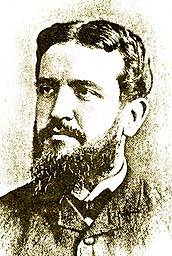3.3.6 The political oratory of Rafael Montoro (1852 – 1893) and the autonomist discourse

Rafael Montoro was the leading figure in a movement that began after the failure of the Zanjón referendum and aimed at conceiving a series of reforms and establishing an autonomous government. His ranks included a political spectrum that also included a hidden element of independence aspirations. Other figures included Antonio Govín, Rafael Fernández de Castro, Eliseo Giberga, José Antonio Cortina, and Miguel Figueroa.
He had left Cuba in 1864 for health reasons, residing in England, France, the United States, and Spain in the decade of 1868-1768. His mentors included Juan Clemente Zenea, Enrique Piñeyro, and Antonio Zambrana. Upon his return to Cuba, he joined the ranks of the autonomists, whose philosophical doctrine he founded. He would serve the party for almost 20 years, in the press and through his speeches.
In addition to his political activities, he worked as a jurist and was interested in various literary genres, socializing at the events organized by the Revista de Cuba, La Caridad del Cerro, and the Liceo de Guanabacoa. He devoted himself to both literary creation and to theoretical and aesthetic issues inherent to literature. During his stay in Spain, he absorbed the best Castilian oratorical practices, reminiscences of which are intelligible in some of his works.
His syntax was characterized by a simplicity, largely devoid of rhetorical figures, and an infallible narrative flow, with very subtle touches of effect and a discourse carefully crafted according to the audience he was addressing. When necessary, he would dedicate a few eulogies to independence martyrs; but, consistent with his social origins, he discouraged revolutionary violence as a solution to the ills inflicted by colonialism.
His political and literary work was perfectly suited to the Republican context. From 1902 onward, he held various public offices, eventually becoming Secretary of State in the government of Alfredo Zayas. Among his literary activities was his editing of the Annals of the National Academy of Arts and Letters and the texts he published in contemporary newspapers: El Palenque Literario, El Figaro, Revista Cubana, La Habana Literaria, Cuba y América, El Comercio, Diario de la Marina, Letras, La Discussion, Revista Cuba Contemporanea, and others. He also dabbled in literary criticism and historical research.








